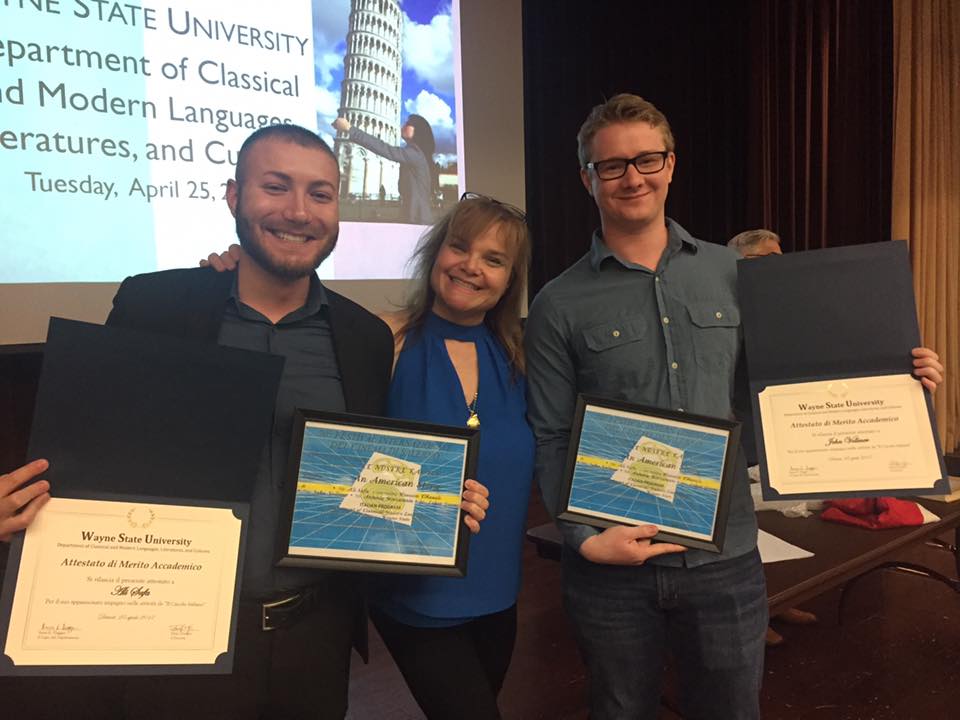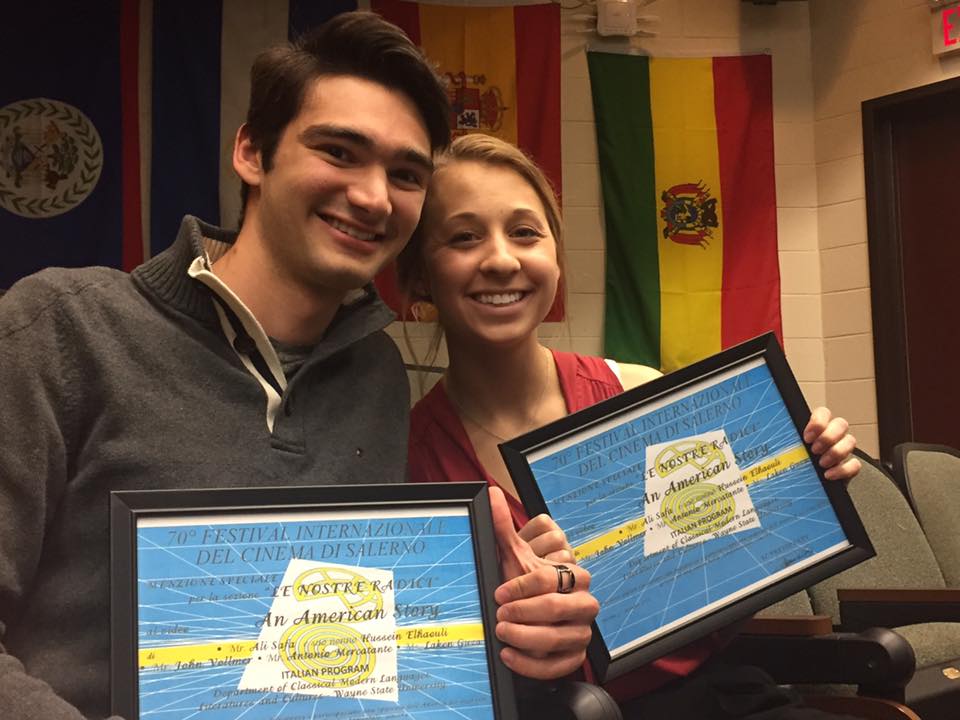Italian students recognized at Salerno International Film Festival
Italian students recognized at Salerno International Film Festival
 Five students in the Italian program completed projects that earned recognition from the Salerno International Film Festival (https://www.festivaldelcinema.it/), which celebrated its 70th anniversary this year. They were recognized both during the festival in Salerno, and then again with certificates presented to them at the annual Italian Awards Day celebration in April. This recognition arrived via local scriptwriter, survivor, and WSU graduate Pierette Domenica Simpson. Simpson's film, Andrea Doria: Are the Passengers Saved?, was recognized as the Best Documentary Film at the Salerno International Film Festival in 2016.
Five students in the Italian program completed projects that earned recognition from the Salerno International Film Festival (https://www.festivaldelcinema.it/), which celebrated its 70th anniversary this year. They were recognized both during the festival in Salerno, and then again with certificates presented to them at the annual Italian Awards Day celebration in April. This recognition arrived via local scriptwriter, survivor, and WSU graduate Pierette Domenica Simpson. Simpson's film, Andrea Doria: Are the Passengers Saved?, was recognized as the Best Documentary Film at the Salerno International Film Festival in 2016.
Filmmaker Luca Guardabascio, a frequent collaborator with Wayne State University, challenged students to produce creative documentary projects charting journeys of immigration, and Wayne State students responded with innovative accounts of their families and friends, as well as stories of their own.
Italian major Rodolfo Hernandez-Diaz created a photo essay for a course with Prof. Elena Past examining the landscapes of his native Jalisco, his home in Detroit, and the seascapes of Professor Silvia Giorgini-Althoen's Livorno, Italy. Colorful photographs of Italy, Mexico, and the United States illustrated the commonalities in experiences of "home," regardless of its geographic location. Hernandez-Diaz explains: "I learned that it doesn't matter what country you come from, immigrants all share some common things. For example, leaving behind family, friends and cities that we love, all to strive to make our lives better. I also learned that most of us still love our cities of origin, but we also love our new homes in the United States."
Working in a course with Dr. Giorgini-Althoen, Laken Guza, Antonio Mercatante, Ali Safa, and John Vollmer produced a short documentary film about Safa's grandfather. As Safa explains, "the film was about my grandfather's journey of leaving Lebanon and bringing his family to Michigan, in 1979, to escape the Lebanese civil war and make a better life for his family." As Mercatante elaborates, the group wanted to tell the story of the "American Dream" and what it means to pursue it.
"It is important to tell stories about immigration because in a sense, all Americans are immigrants," explained Vollmer. "We all have roots that come from somewhere else. Many people today tend to forget that fact. The simple luxury of being born in this country is not the only thing that can make you American.  In fact, coming to this country and wanting to be here of your own volition is an incredible and brave thing to do."
In fact, coming to this country and wanting to be here of your own volition is an incredible and brave thing to do."
In recounting these transnational stories of immigration, the students found that their experience studying Italy resonates closely with the experiences of many generations of Americans, who have roots all over the world.
Mercatante specifies that "immigrants truly embody the definition of 'The American Dream' and they play an essential role in the backbone of our society and culture."
He continues: "I believe that it is important to tell stories of immigration because they are humbling and show the determination and willpower that immigrants have to seek out better opportunities. I also believe that it is important to examine stories of immigration as a means of understanding the world in which we live in. Stories of immigration give insight into why people leave places and go to others, and I think that is very important to understanding the vast array of cultures in our world."
So, as it turns out, telling Lebanese stories in an Italian class is actually vital to thinking about global immigration flows, cultural crossings, and our collective future. As Vollmer elaborates: "How does this relate to Italian? In class we learned about many great Italians of many different time periods. What is amazing to me is that some of these people are not even originally Italian at all. They came from other places but knew Italy was where they wanted to be, and in return they put the country on the map, quite literally in some cases such as Garibaldi or Cavour. The study of any group of people must also include its immigrants: they are the other half of the story that people unjustly forget about."